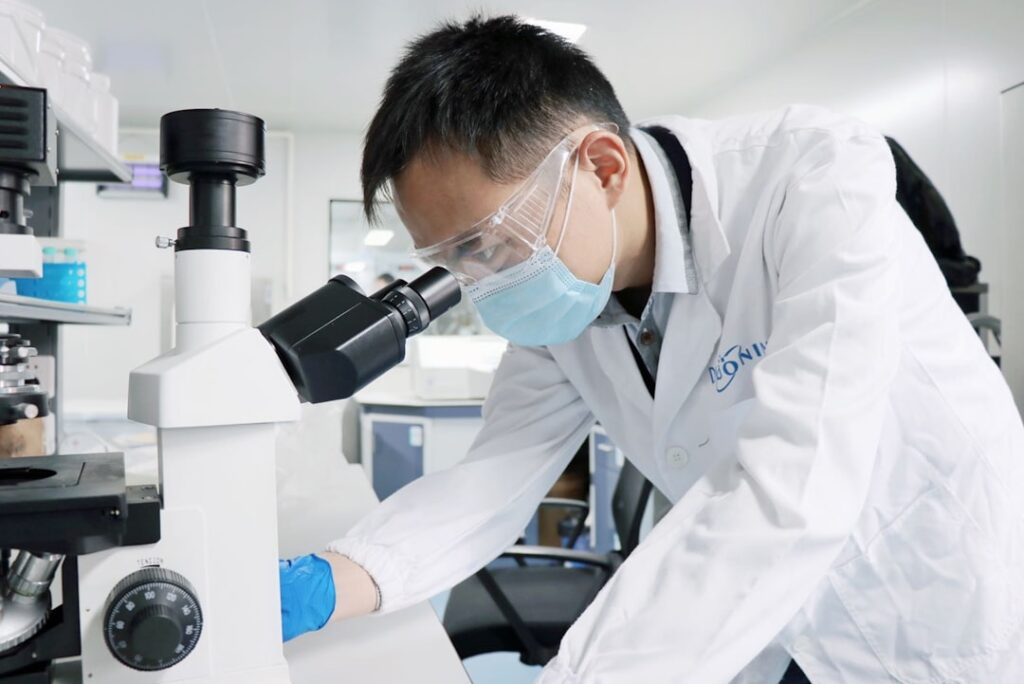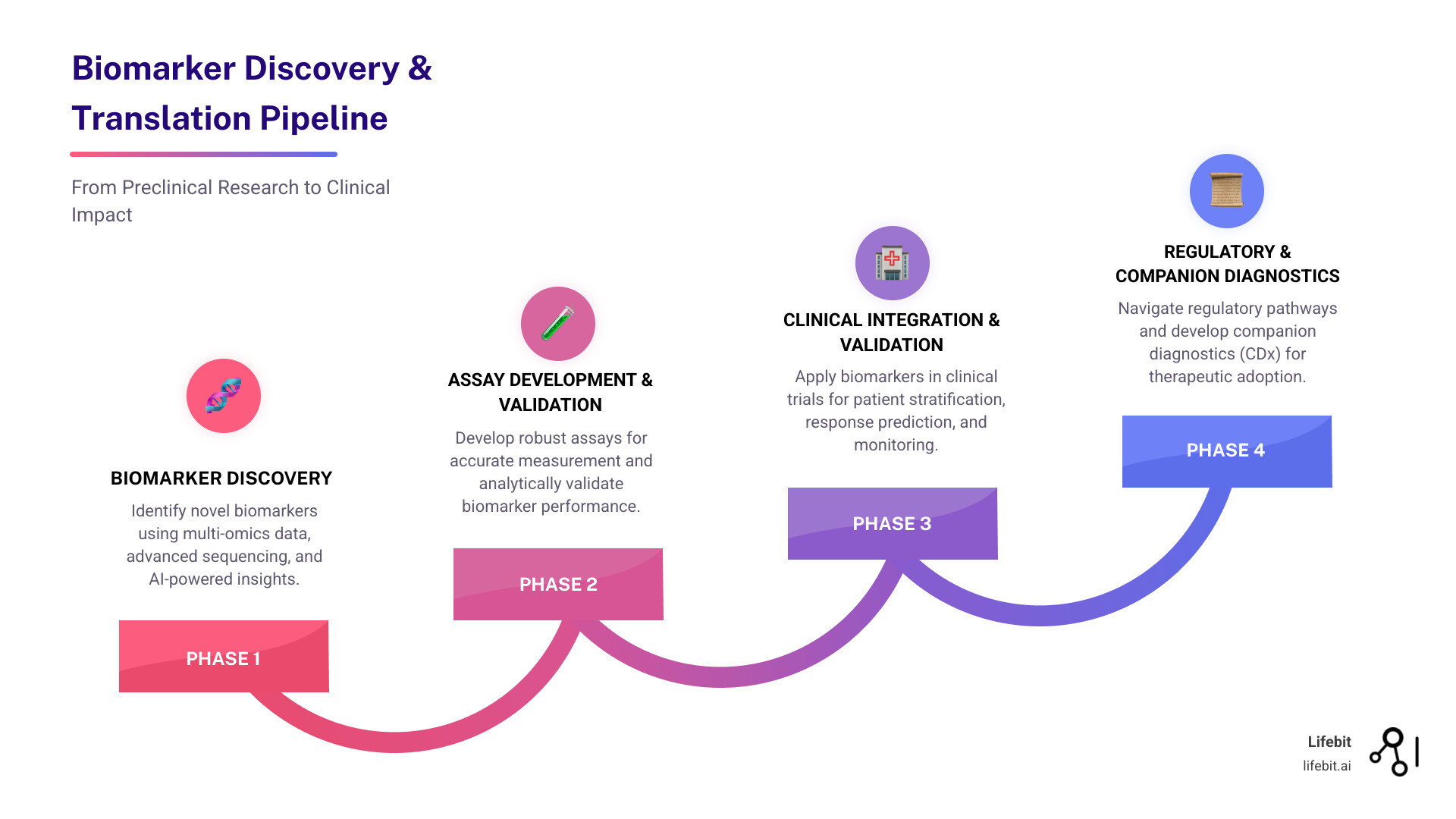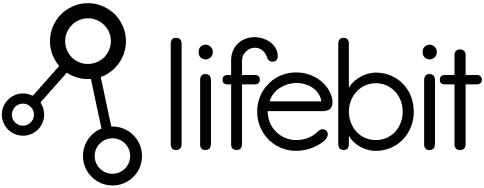7 Quick Ways to Find Biomarker Discovery Companies

Biomarker Discovery Companies: 7 Quick Ways
Why Finding the Right Biomarker Findy Partner Can Make or Break Your Drug Development
Biomarker findy companies are revolutionizing how pharmaceutical organizations identify and validate therapeutic targets. These specialized partners use multi-omics analysis and AI-powered patient stratification to compress years of research into months, accelerating the journey from hypothesis to clinical validation.
Quick Answer: Top Ways to Find Biomarker Findy Companies
- Target therapeutic specialists – Find companies focused on your disease area
- Evaluate their tech stack – Look for multi-omics, NGS, and liquid biopsy capabilities
- Assess AI/ML capabilities – Ensure they can handle complex data analysis
- Prioritize full-service partners – Choose companies offering findy through validation
- Search industry directories – Use CRO databases and biotech buyer’s guides
- Attend conferences – Network at precision medicine and biomarker events
- Check peer networks – Ask colleagues for trusted partner recommendations
The biomarker findy landscape is expanding rapidly. With biomarker-driven approaches proven to increase drug development success rates and reduce costs, choosing the right findy partner is more critical than ever. The right strategy can mean the difference between a successful clinical trial and years of wasted resources.
Finding the right biomarker findy companies requires a deep look into their technical capabilities, therapeutic alignment, and regulatory expertise. As CEO of Lifebit, I’ve seen what separates effective findy partners from the rest while helping organizations steer the complex world of federated data analysis and AI-powered biomarker identification.

1. Target Specialists in Your Therapeutic Area
Biomarker findy is not a one-size-fits-all service. The most important question to ask a potential partner isn’t “What can you do?” but “Do you understand my disease?” You wouldn’t ask a general practitioner to perform brain surgery, and the same logic applies here. A generalist company lacks the nuanced understanding that comes from focusing on a specific therapeutic area.
Each disease area—from oncology to neuroscience to rare diseases—has unique biological pathways, diagnostic challenges, and regulatory problems. A specialized biomarker findy company brings invaluable, battle-tested expertise.
Why therapeutic focus is critical for biomarker findy companies
Specialists offer three key advantages:
- Deeper Biological Understanding: Their teams have dedicated their careers to specific conditions. An oncology specialist, for example, understands tumor heterogeneity and resistance mechanisms, which directly impacts the quality of the biomarkers they find.
- Access to Relevant Patient Cohorts: Validating biomarkers requires the right patient samples. Specialists have established networks to access well-characterized cohorts, which is especially critical for rare diseases where samples are scarce.
- Established Validation Methods: The regulatory pathway for an oncology biomarker is completely different from one for a neurological condition. Specialists know these pathways because they have steerd them before.
Key areas where specialized biomarker findy is making the biggest impact include oncology, immunology, neuroscience, cardiology, and rare diseases. Partnering with a company that shares your therapeutic focus gives you access to accumulated wisdom and proven methods, which is the difference between a findy that works in a lab and one that changes patient lives.
2. Vet Their Tech Stack: From Multi-Omics to Liquid Biopsy
After identifying specialists, examine their technology. The best biomarker findy companies use a comprehensive platform to analyze biological complexity from multiple angles. A modern tech stack is essential for generating high-quality data.
Key technologies to look for include:
- Multi-omics integration: The most effective partners combine genomics, transcriptomics, proteomics, and metabolomics. Integrating these data layers reveals patterns that are invisible when looking at each one in isolation.
- Next-Generation Sequencing (NGS): This is the workhorse for genomic analysis, capable of analyzing hundreds of biomarkers simultaneously in a comprehensive and cost-effective manner.
- Liquid Biopsy: This transformative technology finds biomarkers like circulating tumor DNA (ctDNA) in a simple blood draw, enabling early detection and continuous monitoring without invasive tissue biopsies.
- Advanced Sequencing: Single-cell and spatial analysis provide deeper insights by examining individual cells and their locations within tissues, which is critical for understanding heterogeneous diseases like cancer.
- Mass Spectrometry: Essential for protein and metabolite analysis, this technology identifies and quantifies thousands of molecules with high precision, spotting biomarkers at extremely low concentrations.
The role of advanced sequencing and liquid biopsies
These technologies are changing patient care and drug development by enabling minimally invasive sampling for regular monitoring. Their most exciting benefit is early detection, as liquid biopsies can spot cancer signals in the blood long before tumors are visible on scans. They also allow for dynamic treatment monitoring and the identification of resistance mechanisms. As scientific research on NGS in lung cancer demonstrates, broad sequencing can identify actionable genetic changes missed by other tests.
When evaluating partners, ensure they can integrate these technologies to answer your specific research questions. The best biomarker findy companies don’t just own the equipment; they have the expertise to apply it effectively.
3. Uncover Their AI Power and Data Analysis Capabilities
Modern biomarker findy generates massive, complex datasets from genomic, proteomic, and clinical sources. Human researchers cannot manually process this volume of information. This is where Artificial Intelligence (AI) and Machine Learning (ML) are essential. The best biomarker findy companies use AI to turn mountains of data into breakthrough findies.

Your partner must have a strong bioinformatics backbone to manage and analyze petabyte-scale data. Key capabilities include:
- Data Harmonization: Standardizing and integrating data from different labs, protocols, and formats is crucial for drawing meaningful conclusions across studies.
- Predictive Modeling: AI models can forecast disease progression, predict patient response to drugs, and identify risk groups with increasing precision.
- Federated Learning: This game-changing approach trains AI models on decentralized data without moving it, preserving patient privacy while leveraging global datasets. It’s vital for accessing diverse patient populations while complying with data protection regulations.
The role of AI for leading biomarker findy companies
AI’s impact goes far beyond data processing. It enables:
- Pattern Recognition: AI identifies complex relationships in high-dimensional data, revealing novel biomarkers that are more reliable than single-marker approaches.
- Signature Findy: Instead of single markers, AI can identify multi-biomarker “signatures” that provide more robust insights into disease states and treatment response.
- Patient Stratification: By analyzing a patient’s multi-omic profile, AI can predict who will respond best to specific therapies, revolutionizing clinical trial design and improving success rates.
When evaluating biomarker findy companies, prioritize their AI and data analysis capabilities. The ability to transform biological data into actionable insights is what separates leading partners from the rest.
4. Prioritize Full-Service Partners: From Findy to Clinical Validation
Finding a promising biomarker is only the beginning. The path from a lab finding to a clinically approved diagnostic is filled with technical, regulatory, and validation problems. Choosing a full-service partner that can guide you through the entire process is critical for success.
Working with biomarker findy companies that offer end-to-end support provides a seamless flow between stages, eliminating the risks and delays of hand-offs between multiple vendors.
The value of an end-to-end process
A comprehensive partner manages the entire pipeline:
- Findy: Identifying promising biomarker candidates using advanced omics and bioinformatics.
- Validation (Analytical & Clinical): Proving that an assay is accurate and that the biomarker reflects the disease state in real patients.
- Assay Development: Creating a robust, reproducible test that works reliably in a clinical setting.
- Clinical Translation & Utility: Demonstrating that the biomarker improves patient outcomes in clinical trials.
- Regulatory Support: Navigating the complex FDA and EMA requirements for approval, especially for Companion Diagnostics (CDx) and In Vitro Diagnostics (IVD).
The biomarker validation and translation process
The journey from lab to clinic follows a structured path. Analytical validation confirms the test is reliable. Clinical validation establishes that the biomarker provides meaningful information. Finally, clinical utility proves that using the biomarker actually improves patient care.
A full-service partner understands how each stage impacts the next, leading to faster timelines, fewer errors, and life-changing therapies reaching patients sooner.
5. Use Industry Directories to Find Biomarker Findy Companies
When searching for biomarker findy companies, specialized industry directories and databases are your most efficient tool. Instead of random searching, these resources provide curated lists of companies categorized by services, therapeutic focus, and technology.

Here are the best places to look:
- CRO Directories: Contract Research Organizations (CROs) often provide biomarker services as part of their broader drug development support. These directories list organizations with extensive experience across the findy, preclinical, and clinical phases.
- Biotech Databases and Buyer’s Guides: These resources cast a wider net, capturing both large players and smaller, specialized firms. Buyer’s guides for biomarker services offer detailed profiles and context, helping you understand each company’s specific offerings.
- Professional Associations: Member directories connect you with reputable companies that adhere to industry best practices.
- Conference Exhibitor Lists: Reviewing exhibitor lists from major precision medicine or biomarker conferences gives you insight into which companies are at the forefront of innovation.
Using these directories allows you to efficiently generate a comprehensive list of potential partners, saving valuable time and ensuring you don’t overlook key players in the field.
Frequently Asked Questions about Biomarker Findy
Here are answers to the most common questions pharmaceutical teams ask about biomarker findy companies.
What are the different types of biomarker services offered?
Biomarker services cover the entire development pipeline. Key offerings include:
- Findy Services: Using technologies like genomics and proteomics to identify new biomarker candidates from biological samples.
- Validation Services: Rigorously testing candidates to prove they are accurate and clinically relevant.
- Custom Assay Development: Designing bespoke tests for specific biomarker needs when off-the-shelf solutions are not available.
- Bioanalytical Testing: Measuring biomarker levels in samples according to strict regulatory standards (GLP/GCP).
- Data Analysis and Bioinformatics: Applying statistical and AI-driven methods to interpret complex multi-omics datasets.
- Regulatory Consulting: Providing expert guidance on navigating FDA and EMA approval pathways.
How do biomarkers contribute to personalized medicine?
Biomarkers are the foundation of personalized medicine, enabling a more precise approach to treatment. They are used for:
- Patient Selection: Identifying which patients are most likely to respond to a specific therapy, increasing clinical trial success rates.
- Targeted Therapies: Revealing the molecular drivers of a disease, allowing for the development of drugs that hit specific targets.
- Dose Optimization: Determining the right drug dosage for each individual.
- Treatment Monitoring: Tracking therapy effectiveness in real-time.
- Predicting Adverse Events: Identifying patients at risk for serious side effects from certain drugs.
What are the key challenges in the biomarker findy landscape?
Biomarker findy is complex. Major problems include:
- Sample Accessibility and Quality: Obtaining high-quality biological samples is often difficult, especially for rare diseases.
- Data Complexity: Integrating and harmonizing massive multi-omics and clinical datasets from various sources is a significant technical challenge.
- Reproducibility: Ensuring that a biomarker test produces consistent results across different labs and patient populations.
- Clinical Validation: Proving a biomarker’s clinical utility requires large, expensive, and time-consuming clinical trials.
- Regulatory Pathways: The rules for biomarker approval are intricate and constantly evolving, requiring specialized expertise.
Conclusion
Finding the right biomarker findy companies is a strategic decision that can make or break your drug development program. By following a systematic approach—targeting specialists, vetting their tech and AI capabilities, and prioritizing full-service partners—you can find an ally to accelerate your timeline. Using industry directories, networking, and peer recommendations will further streamline your search.
Your choice of partner is critical. A biomarker-driven approach can dramatically increase success rates and lower costs, but only with the right expertise and technology.
The future of biomarker findy is AI-driven research and secure data collaboration. As biomedical data becomes more distributed, the ability to securely access and analyze it will define success.
This is why we built the federated AI platform at Lifebit. We provide secure, real-time access to global biomedical and multi-omic data, with built-in harmonization, advanced AI/ML analytics, and federated governance. Our platform accelerates biomarker findy for biopharma and public health agencies while ensuring data privacy.
Partnering with the right company is an investment in the future of precision medicine. The leaders in this space will drive the next wave of medical breakthroughs.
Ready to see how federated AI can accelerate your biomarker findy? Learn more about solutions for commercial pharma and find how we’re changing biomedical research at lifebit.ai.

